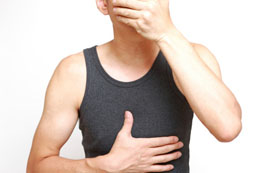Unhealthy dietary habits are often the contributing factor for excessive burping and chest pain. This write-up specifies the medical conditions that may cause pain in the chest along with excessive belching.

Burping, also known as belching or eructation, is a process involving expulsion of stomach or intestinal gas through the mouth. It is not a disease in itself, and is not really a cause of great concern. In fact, abdominal discomfort or even the feeling of pain or pressure in the chest caused by gas is often eased by burping. However, constant belching can cause a great deal of embarrassment in public.
Possible Reasons for Chest Pain and Belching
Have you been burping a lot lately? If your answer is in the affirmative, then it's possible that your diet includes foods that cause gas. So, excessive buildup of gas can be prevented by changing your dietary habits. Unhealthy eating habits can also give rise to some conditions that may cause belching along with pain in the chest. Given below is some information on such medical conditions and ways to deal with them.
Dyspepsia
Heartburn, belching, bloating, nausea, and a variety of distressing symptoms are associated with dyspepsia. Dyspepsia, commonly referred to as indigestion, is usually caused due to the consumption of foods that are not easily digestible. Many a time, people don't chew food properly or rush food down quickly. As a result, they might end up swallowing air while eating. This condition is medically referred to as aerophagia. The air that gets trapped would cause discomfort. Thus, it would have to be expelled through belching. Stress, smoking and consumption of alcohol are other factors that can also adversely affect the digestive process and lead to indigestion. At times, indigestion might be associated with conditions such as gastritis, stomach flu, or peptic ulcers. Gastritis refers to the inflammation of the lining of the stomach due to an infection caused by a bacterium called
Helicobacter pylori. Prolonged use of certain drugs can also erode the lining of the stomach. Sores or ulcers can form when stomach acid and pepsin comes in contact with the eroded lining of the stomach. The pain from the inflamed stomach could also be referred to the chest region.
Gastroesophageal Reflux Disease
This medical condition is associated with the back flow of stomach acid into the esophagus. The back flow of stomach acid may also cause burping and pain in the chest right after meals. The burning sensation in chest caused due to the regurgitation of the gastric juices is medically referred to as heartburn. The back flow of stomach acid may be attributed to weakening of the lower esophageal sphincter, which is a valve that pushes the food into the stomach. The valve may weaken due to consuming fatty foods. Fried foods, acidic foods, caffeinated drinks, and alcohol can cause heartburn in some people. Those who are lactose intolerant might experience pain in the chest and excessive belching after consuming dairy products. Prolonged use of certain drugs may also weaken this valve. Pregnancy and diabetes are other conditions that may increase the incidence of heartburn.
Hiatal Hernia
Hiatal hernia is a condition wherein the upper section of the stomach bulges through an opening in the diaphragm. This opening is usually large enough for the esophagus to pass through. If the opening is larger than its normal size, the upper portion of stomach may protrude towards the chest. This condition may also occur, if the esophagus is not firmly attached to the diaphragm. Straining during bowel movement, excessive coughing, obesity, smoking, and weakness of diaphragm can make one susceptible to hiatal hernia. This form of hernia can also lead to the weakening of the esophageal sphincter muscle, which in turn, may increase the risk of gastroesophageal reflux. Under these circumstances, one is likely to experience symptoms such as tightness in chest, difficulty swallowing, coughing, hiccups, pain in the chest, heartburn,and excessive belching.
Chest pain and burping are most likely to be experienced by those who have poor eating habits and also lead a sedentary lifestyle. Such individuals need to make certain lifestyle-related changes soon. They should follow a healthy fiber-rich diet and refrain from the consumption of processed foods. They should also cut down on the intake of alcohol, coffee, and carbonated drinks. If these symptoms persist even after making dietary changes, then consult a doctor soon.
Disclaimer:
The information provided in this article is solely for educating the reader. It is not intended to be a substitute for the advice of a medical expert.


 Burping, also known as belching or eructation, is a process involving expulsion of stomach or intestinal gas through the mouth. It is not a disease in itself, and is not really a cause of great concern. In fact, abdominal discomfort or even the feeling of pain or pressure in the chest caused by gas is often eased by burping. However, constant belching can cause a great deal of embarrassment in public.
Burping, also known as belching or eructation, is a process involving expulsion of stomach or intestinal gas through the mouth. It is not a disease in itself, and is not really a cause of great concern. In fact, abdominal discomfort or even the feeling of pain or pressure in the chest caused by gas is often eased by burping. However, constant belching can cause a great deal of embarrassment in public.